Rules
Mantra is a fantasy football system that came to us from Italy and is aimed at those who want to immerse themselves in the game, as well as emphasizes the value of each player's choice.
Fantasy football is a game in which users form a virtual team of real football players and, depending on their performances, score points.
Mantra is our reinterpretation of fantasy, a kind of advance level where we changed everything that pissed us off in the classic one.
And it's a great way to have fun with friends and find new ones!
Basic
- We form a league of 6-10 managers.
- We hold an auction where managers form their own team.
- For each round, the manager chooses a team of 11 major players under certain tactics, and also forms a bench.
- After real matches, players are awarded a score and bonuses / maluses for their actions in matches.
- The sum of all players' points is converted into team goals.
- A team earns tournament points if it scores no less than the opponent's team.
- The team with the most points in the league wins the cup.
Why play?
- Uniqueness of players - each player will be unique in the league and will only bring points one team.
- Emphasis on the functions of the manager - you will feel like a real football coach who 'puzzles' over who to put in the starting lineup.
- An active part of the game is tactics - which module to choose: 4-4-2 or 3-4-3, who to put on the bench, and who will not get into the lineup?
- Dynamics from round to round - you can rely on some performers of this matchday, but next time they will not bring so many bonuses.
- Great community of participants with whom you can discuss all the events in the world of football or to argue about which championship stronger?
How are Leagues formed?
Leagues are formed on the basis of submitted applications, where you indicate in which tournaments you want to play. Managers' wishes are taken into account - you can create a league with your friends or join other members.
The composition of the league does not change during the season.
Available tournaments
Each tournament can have several leagues in which you can participate.

Italy

England

Germany

France

Spain

England 2 Div

Netherlands

Belgium

Portugal

Ukraine

United States

Poland

Brazil

Turkey

Europe CL

US Play-off
Auction
- The formation of teams in the league takes place according to the results of the auction.
- The starting auction is held before the start of the season, but managers will subsequently have the opportunity to change their team squad in additional auctions that will take place at specific times ('transfer windows') throughout the season.
- Each manager, before the starting auction, receives a budget of 260 million to buy players.
- Each team must consist of 26 players (of which at least 3 must be goalkeepers).
- Teams are formed from real players of the selected football championship.
- Each player is unique and can only be represented by one team in the league.
- There are no restrictions on the number of representatives of one football club in one team.
- Incoming transfers outside the transfer windows are not provided.
- There are two types of auction: blind (default) and live.
How is a blind auction conducted?
The blind auction is the primary format used for team building because it does not require all managers to be online or offline at a pre-arranged time.
- The blind auction takes place online directly on the MantraFootball website in several stages.
- In the initial auction, managers have access to a list of all players in the respective football championship, from which they must purchase 26 players (at least 3 of which are goalkeepers), using their starting budget (260 million).
- In the first stage of the auction, managers need to bid on 11 players (at least 1 of whom is a goalkeeper), allocating up to 220 million from the team's budget (another 40 million are reserved and will be available from the second stage).
- In the second and subsequent stages of the auction, managers will need to bid on X players, where X is 26 minus the number of players purchased previously.
- The bid is an integer multiple of 1 (where 1 means 1 million).
- The minimum bid for a player in the first two stages of the starting auction depends on the player's performance in this championship last season - from 1 to 20 million. From the third stage of the starting auction and in the intermediate auctions, the minimum bid is 1 million for all players.
- The maximum bid per player is limited only by the team's total budget.
- The first stage of the initial auction closes on a pre-determined deadline, provided that all league managers have confirmed their bids. Subsequent stages of the starting auction are settled within 10 minutes after all managers have finally closed their bids, or after the deadline, provided that all bids have been submitted.
- The stages of the intermediate auctions are calculated in advance if there are finally closed bids from all league managers, or by the stage deadline - taking into account only confirmed bids at the time of the deadline.
- After the auction stage is complete, the system automatically compares the bids made by all managers.
- The manager who placed the highest bid on a certain player takes him to his team, automatically reducing his budget by the amount of the bid placed on this player.
- If the manager failed to purchase the player, the amount of the bid on him is returned to the budget.
- If several managers have placed an equal bid on a certain player, and no one has exceeded this bid, such a player is considered unsold and remains available for purchase by any manager in the following stages of the auction (and the bids placed on him are returned).
- The stages of the auction are repeated until all managers have fully formed their teams of 26 players.
- Until the end of the next round of the auction, managers should not know which players other managers have selected and what bids they have placed.
- After the auction ends, you can view your bid history on the relevant auction page.
- If a manager does not submit a bid by the deadline of the first stage of the initial auction, his team receives a -1 penalty point in the standings. For each subsequent 12 hours of delay in submitting a bid at the auction, the team is awarded an additional -1 penalty point. If there is no bid for more than 2 days from the deadline, the team manager may be replaced.
Minimum prices at the blind auction
In the first two stages of the initial auction, some football players (about 50) have their minimum bid. These minimum bids apply ONLY on the first two stages of the initial auction and are aimed at making the team composition more balanced.
Players will have a minimum price if they played 13+ matches last season in this league and were ranked in the top 5 players of the league in their position or had an average total score of 8.0+ last season.
Average total score range
Minimum price
Less than 8.00
5 mln
8.00 - 8.49
10 mln
8.50 - 8.99
15 mln
9.00 or more
20 mln
Note!
- Before the auction, we recommend that you familiarize yourself with the available game modules (schemes of the placement of players) and form the composition of your team taking into account the necessary positions.
- Any pre-arrangements between multiple managers regarding the players they have selected and the price offered for them (before the results of the next round of the auction are revealed) are considered fair play and are strictly prohibited by the community.
What is the live auction?
A live auction is a meeting of all league managers (more often online, less often offline) who bid for players in real time and with an open bid. On average, a live auction lasts 4 hours (such an auction takes place only at the request of all league managers and the administrator's consent).
Each manager in turn names a football player for whom he is ready to pay at least 1 million from his budget. After that, the other managers can (but are not required to) make their bid. Each subsequent bid must be greater than the previous one by at least one step. The rate step is determined by the current rate. If the current rate is in the range from 1 to 19 - the minimum step is 1 million, in the range of 20-29 - 2 million, in the range of 30-39 - 3 million and so on. If no one has exceeded the current bid within 10 seconds, the player is considered sold.
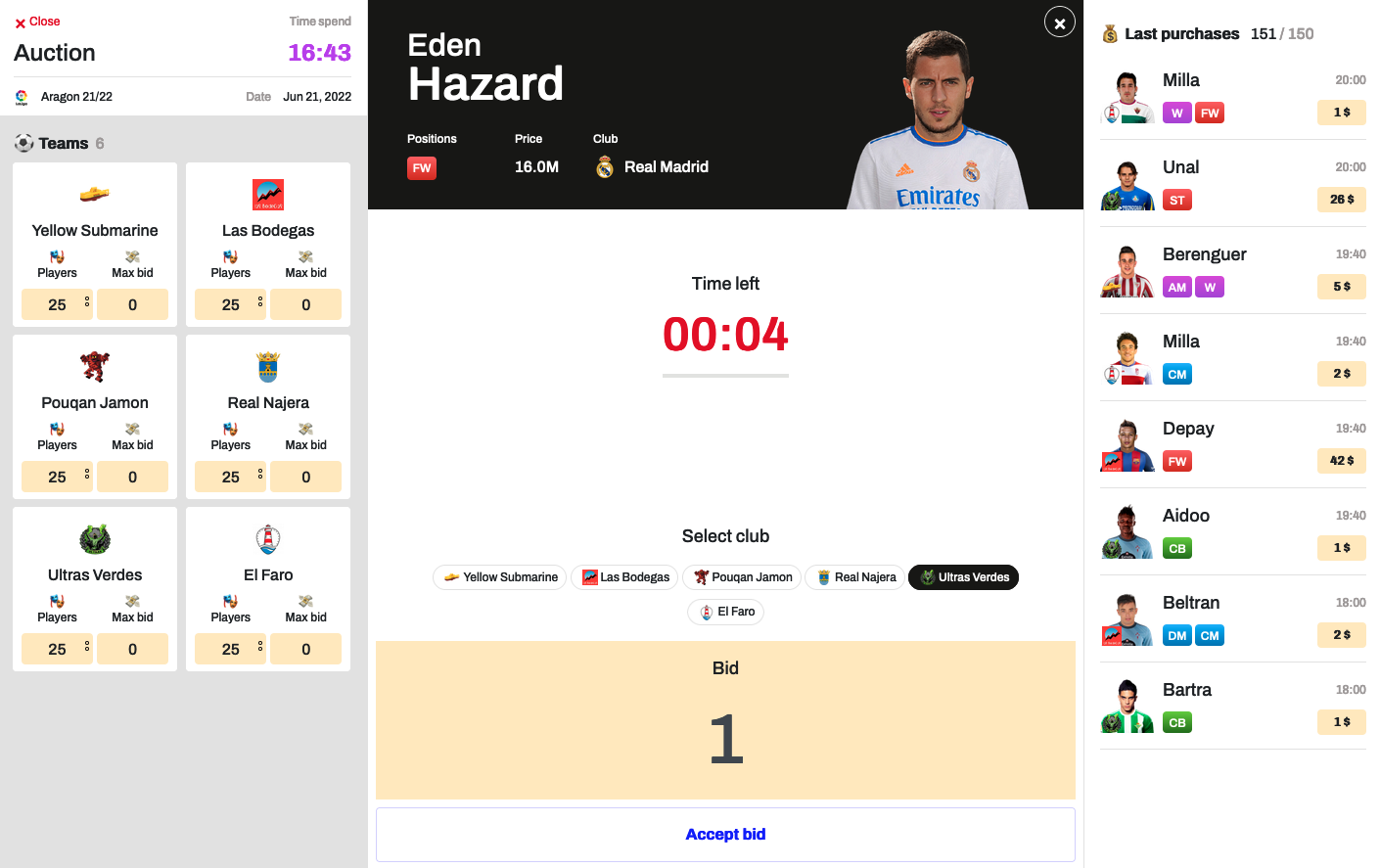
Auction page
Here you can see the course of the auction for Eden Hazard
Auction schedule
Intermediate auctions are provided to make changes to the composition of the teams, exclude injured players or those who lost their place in the team during the season.
Intermediate auctions, unlike the initial one, are held according to the following principle:
- During the transfer window (after its announcement and before the deadline), the manager can select several players from his team to sell.
- The amount that was previously paid by the manager for this player is returned to his budget, and the player himself becomes a free agent. Such a player will be available for purchase by any other league manager other than the one who sold him. The manager who sold the player will not be able to buy him until the next transfer window.
- During the season, the transfer window opens 4 times (except for some championships where this number may be higher). The exact schedule can be found in the 'Auctions' menu of the league after it is created. The approximate schedule is as follows: I – the first half of September, II – the second half of November, III – the first half of February, IV – the second half of March.
- Each team receives a certain number of transfer slots per season (20 in the 2025/26 season), which can be distributed to auctions throughout the season, but there must be at least 2 slots remaining for each auction.
- If there are more than 4 intermediate auctions in a particular championship, or the league starts later, the number of slots will be calculated as 5 slots for each intermediate auction.
- A player who left the championship (due to transfer, early termination of the contract, etc.) leaves the team on his own and the amount paid for him is returned to the manager's budget.
- A player who has changed clubs within one tournament does not leave the Mantra team.
- Intermediate auctions are always conducted in a blind format.
Note!
During one transfer window, the manager cannot re-acquire a player he sold.
Game Round
The Mantra football season consists of game rounds that completely coincide with the calendar rounds of the real football championship.
- To participate in the game round, the manager must first choose module which will determine the layout of his team's players.
- According to the selected module, having a team of 26 players at his disposal, the manager determines 11 players of the main squad and 9 substitute players.
- The deadline for choosing the team coincides 1.5 hours before the start of the first match of the corresponding round of the real football championship. After the deadline, the manager cannot change his chosen module and player composition.
- The main goal of every manager is to 'score' more goals to the opponent than he 'scores' in return.
- The number of goals scored is determined based on the total score of all players, taking into account bonuses and malus and is calculated by a simple formula.
- To determine the basic score of a player's performance in a specific match for most championships, FotMob statistical resource is used.
- For the Ukrainian Championship, the source of ratings is the SofaScore statistical resource.
- The game round completely coincides with the calendar round of the tournament and ends only after all the matches of the corresponding round of the real football championship have been played. If one or more matches have not been played in a certain round (for example, a match has been postponed to another date), the game round is not completed until such matches are played.
Note!
If the manager does not create his lineup by the deadline, the system will automatically copy the module and player lineup for him from the previous game round (without taking into account the substitutions made).
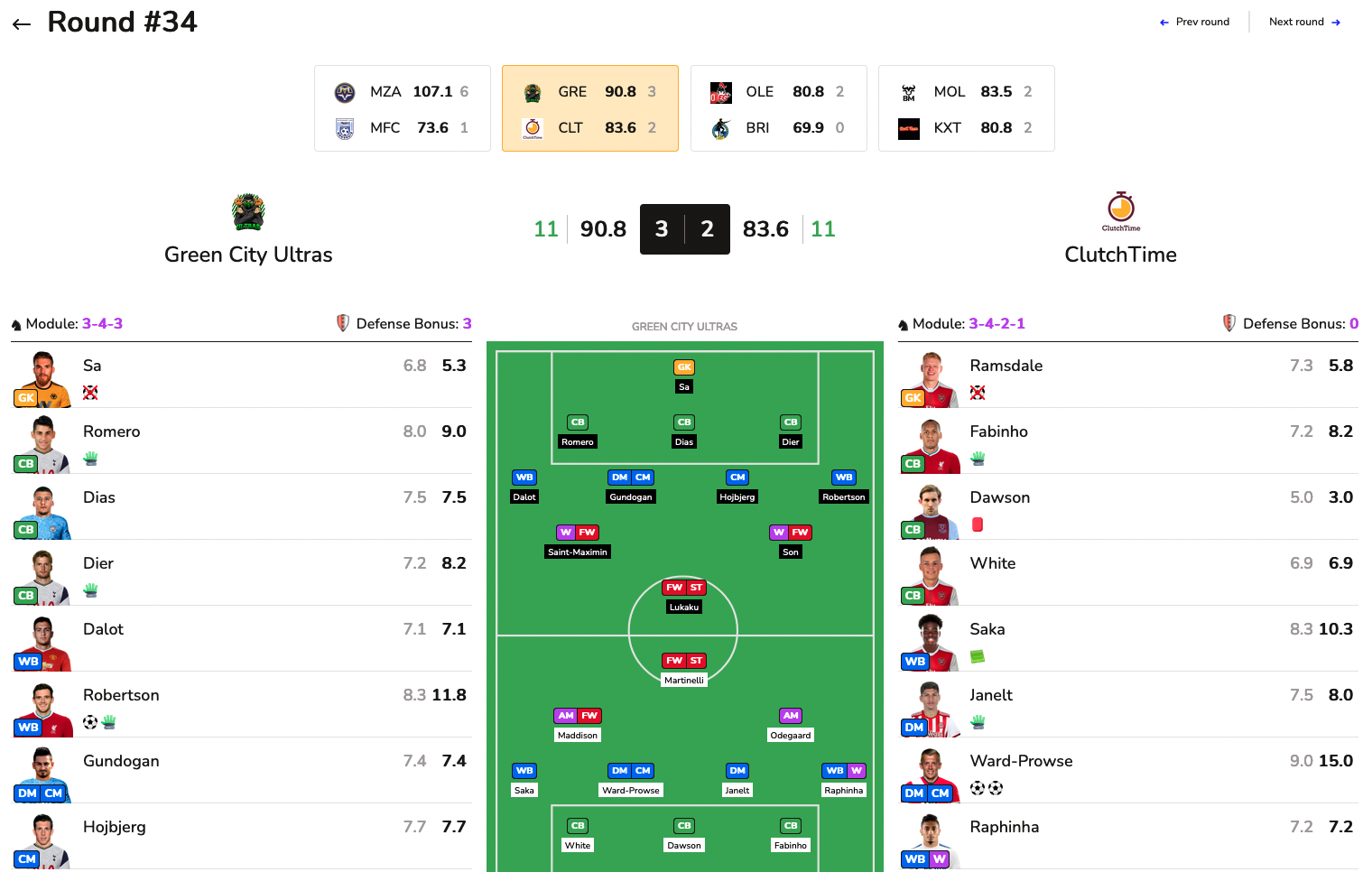
Match center
Here you can review your lineup and progress against the opponent.
Players positions
The main characteristic of each player is one or more 'native' game positions in which he can play. There are a total of 11 game positions in the Mantra fantasy football system:
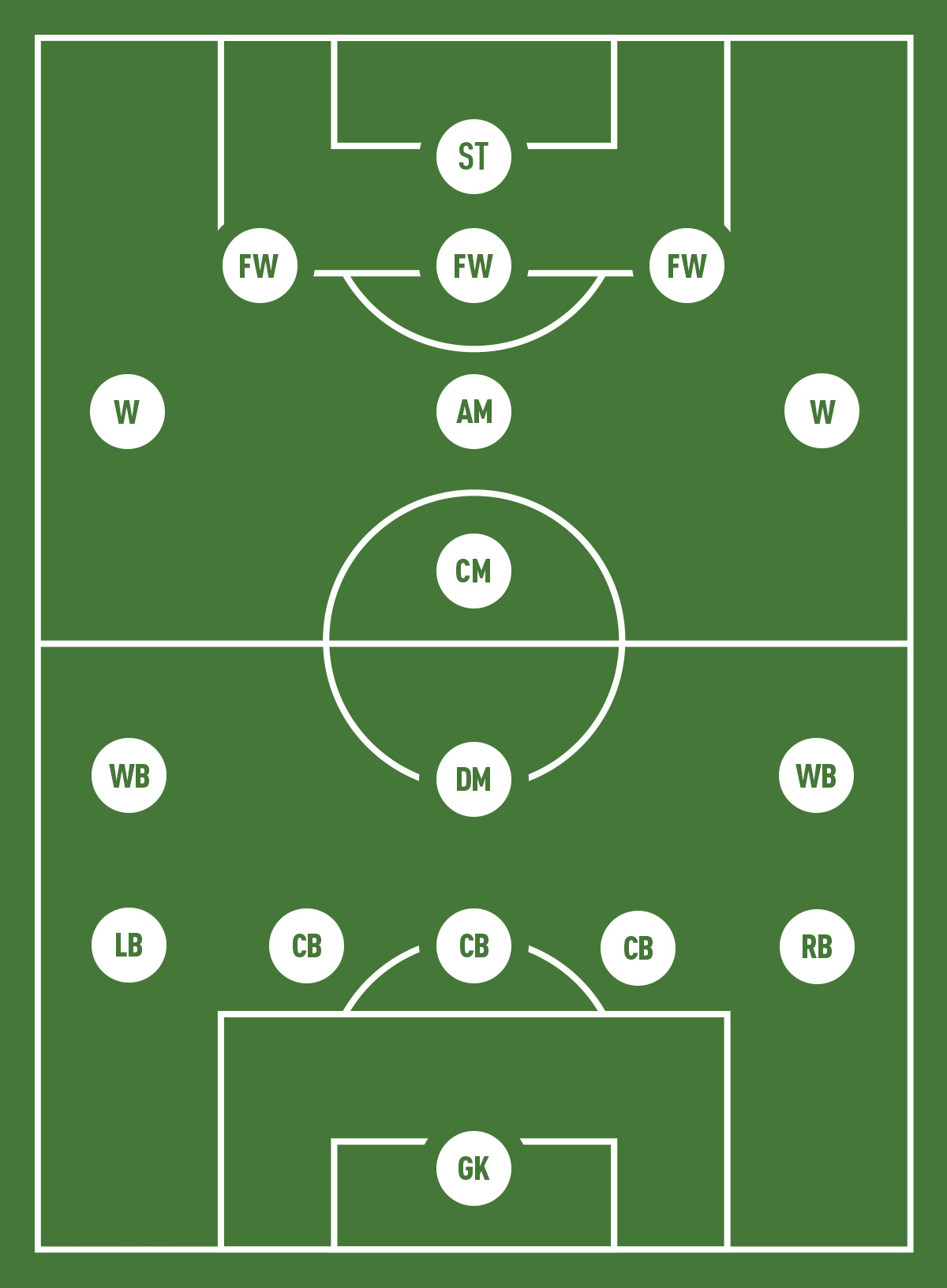
GK
(Por*)
– goalkeeper
RB
(Dd)
– right defender
CB
(Dc)
– central defender
LB
(Ds)
– left defender
WB
(E)
– wingback / lateral
DM
(M)
– defending midfielder
CM
(C)
– central midfielder
W
(W)
– wing midfielder
AM
(T)
– central attacking midfielder
FW
(A)
– wing forward / second striker
ST
(Pc)
– central striker
* - position name according to the italian naming
- If a player has more than one game position in their profile, they can play any of them in the module
- Players of some positions may be assigned to a 'non-native' position for them with the application of a penalty (malus) to their final score
- The player's position chosen by the manager may not coincide with the position in which this player will play in the real match (this does not affect the calculation of points).
Note!
- The 'native' positions of players in the Mantra fantasy football database remain unchanged throughout the season and do not always coincide with the positions of these players indicated on other football resources.
- The characteristic 'left/right' applies only to the position of full-back and does not apply to the positions of midfielder, winger, etc.
- The source for determining the 'native' positions is the historical data of the Transfermarkt resource and the subjective methodology of the MantraFootball administration.
- We strongly encourage managers to submit requests for (in their opinion) discrepancies between Mantra positions and actual player positions. Such requests are considered during the break between seasons.
Position determination algorithm
- The player's position is assessed based on the last season (provided that the player has played 15 or more matches). If their number is less, the total number for the last 2 seasons are taken into account (hereafter - the Analyzed period).
- Data source – statistical information from the Transfermarkt resource (hereafter - the Source).
- The correspondence of the source positions to the Mantra positions is as follows: GK – GK, RB – RB, CB – CB, LB – LB, RM|LM – WB, DM – DM, CM – CM, AM – AM, LW|RW – W, SS – FW, CF – ST.
- When a player transfers to another club, the formation of his new team does not affect the determination of his position.
- The player's main position is considered to be the one where he played the most matches in the analyzed period (p.1). Note that according to p.3, the number of matches in the positions indicated by “|“ is summed up.
- If a player has fewer than 5 matches in the main position during the Analyzed Period, then the position is assigned to this player by the Mantra administration using additional data from the Source.
- To receive an additional position, a player must play at least 30% of matches in it during the analyzed period.
- If the additional position is “lower” than the main one, then even when performing p.7, such a position is not added (relevant for pairs “WB-W”, “CM-AM”, “CV-DM”, “DM-CM”, “W-FW”, “AM-FW”, where the “lower” position is indicated first). Example: 30 matches, of which 14 CM and 16 AM -> AM; 28 matches: 15 DM, 13 CM -> DM+CM
- An additional player position can be granted only if clause 8 is fulfilled and the additional position is placed in the same or adjacent line (order of lines: Green-Blue-Purple-Red).
- If a player's only position is LB or RB (or both of these positions), then the additional WB position is automatically provided.
- If, in addition to the main position LB or RB, there is also an additional position CB, then clause 10 is not fulfilled.
- The main position WB can be further expanded with an additional position (outside the analyzed period) if in the last 2 seasons the player has played more than 10 matches in the CB, RB or LB positions.
- Combining the ST position with another is not allowed.
- For players whose main position during the analyzed period is ST, the last 2 seasons are additionally checked (provided that the player played more than 15 matches in both seasons). If the main position was ST in both seasons, then this position is assigned, otherwise - FW.
- A player's primary position is considered FW if, during the analyzed period, he played most of the matches in the LW/RW/AM positions, but more than 30% of the matches in total were played in the CF and SS positions.
- A player will receive an additional FW position if, during the analyzed period, he played the majority of matches in the LW/RW/AM positions, but more than 10% of matches in total (3 or more) were played in the CF and SS positions.
Modules
The first stage of forming a team for a certain round is the selection of a module that determines the layout of the players of his team.
The system will suggest a default module that you can change.
In total, there are 12 modules in the system:
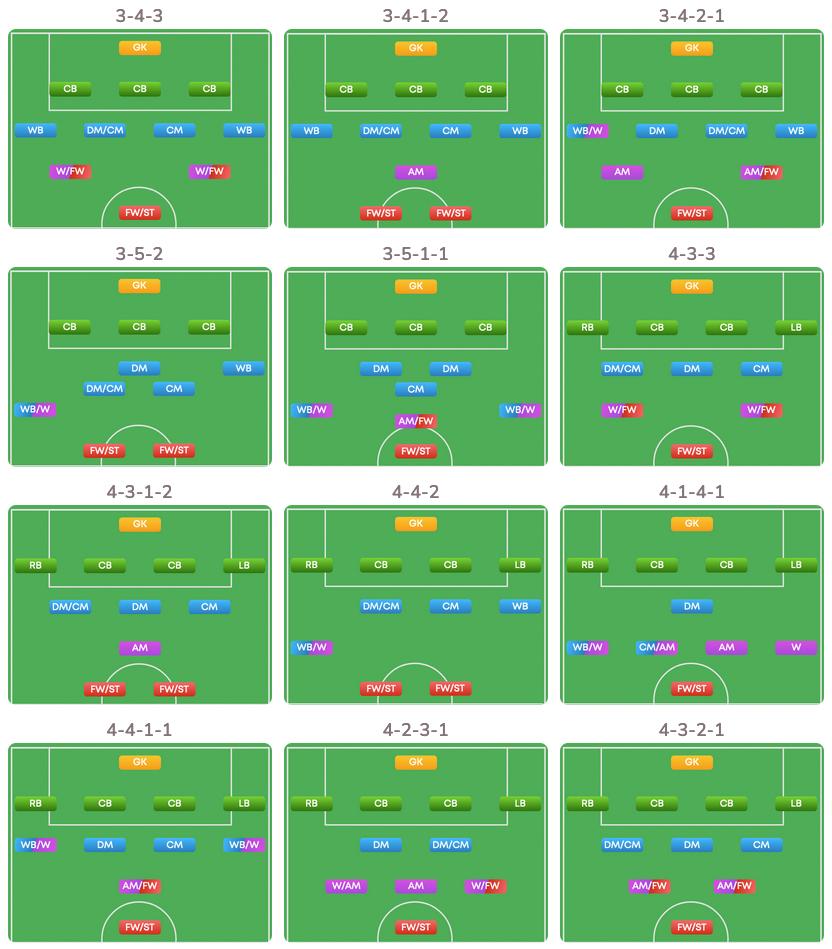
Some modules allow a positional alternative, such as WB/W. This means that a player of both one (WB) and another (W) position can be placed in the corresponding place without any malus (penalties).
Lineup selection
When selecting a lineup for a round, the manager selects a module to play (drop-down list near 3-4-3 in the image) and players for each position and substitution. To assign a player to a position, click on the corresponding slot in the list displayed in the right half of the screen.
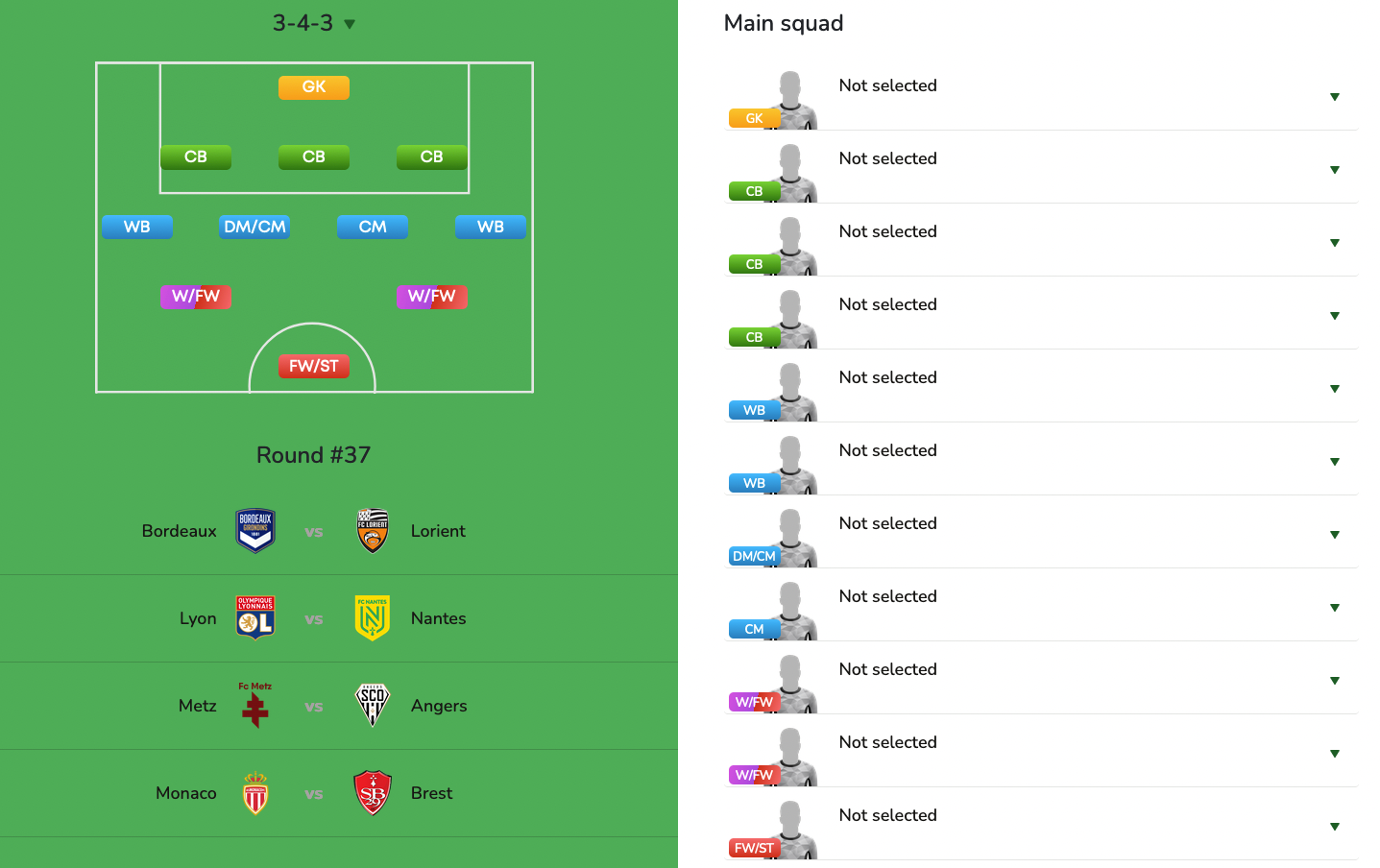
Lineup page
This is the place where you can select your squad for current Round
Once clicked, a pop-up window will appear with a list of players available for assignment to the respective position.
The list of players is formed according to the following principle:
- the first block shows the players who can 'play' in the corresponding position without a malus (in the example below: Gueye, Sissoko and Verratti).
- the second block displays players who can 'play' in the corresponding position with -1.5 points malus (in the example below: Kamara)
- the third block displays players who can 'play' in the corresponding position with a -3 points malus (in the example below: Payet, Majer and Reine-Adelaide)
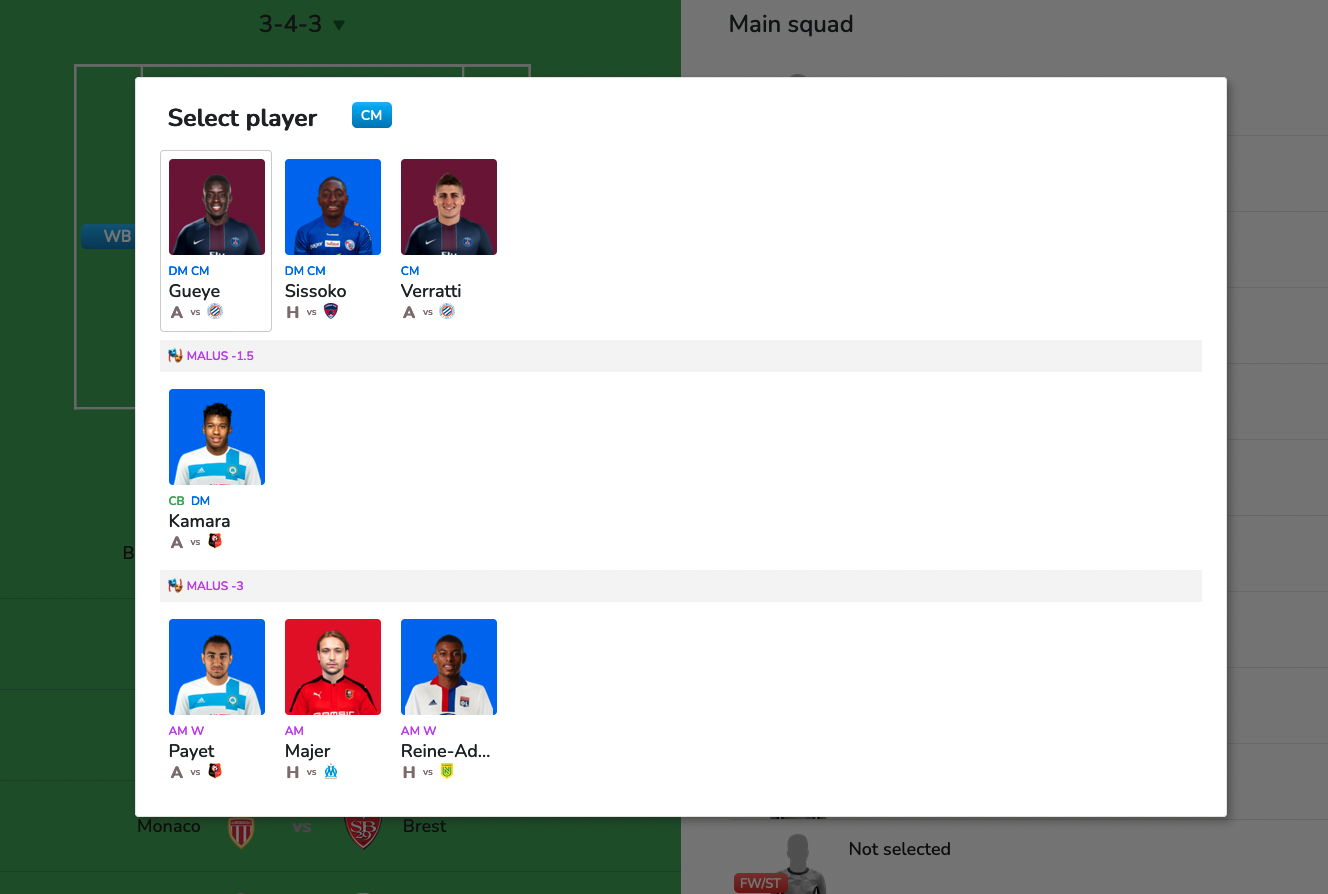
Player selection
This step will help you to choose best option for selected position
For the convenience of choosing players, the following information is provided:
- portrait of the player
- his 'native' positions
- his last name
- the logo of the club against which the player's team will play their next match
- H (Home) or A (Away), which indicates where the player's team will play their next match
Note!
When choosing a player with a position malus, after maintaining the composition, he will be indicated by a yellow triangle with an exclamation mark:

Substitutions
In addition to the 11 players of the main team, the manager chooses 9 substitutes, among whom there must be at least 1 goalkeeper.
Substitute players are meant to replace main players who have not played in their club's respective match in the real football tournament.
Substitutions take place according to the following rules:
- If a player of the main team did not play a match, he is replaced by a substitute player who has the required playing position.
- If among the substitute players there are several players who can be replaced by position - preference is given to the player who is higher in the list of substitutes (the order of players on the bench is the order of priority).
- If there is no player with the required playing position in the list of reserve players, a player whose position allows for a substitution with a malus of -1.5 points is substituted.
- If there is no player in the list of reserve players, whose position allows for a substitution with a malus of -1.5 points, then a player whose position allows for a substitution with a malus of -3 points is substituted.
- The maximum possible number of substitutions in a tour for one team is 9.
- If there are no substitute players on the list who can be substituted with a malus, the substitution does not take place, and the corresponding position remains empty (as a rule, this situation is the worst for the manager, therefore, when choosing a lineup, we recommend carefully studying the probability of the appearance of the corresponding player in a real match).
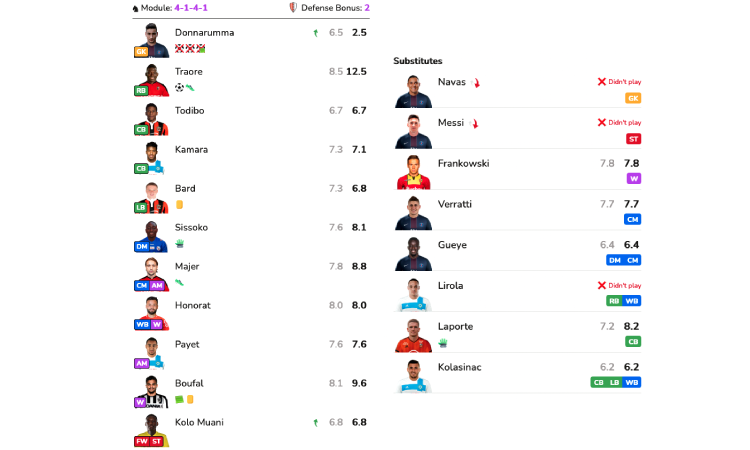
Substitutions
An example of substitutes after a game - Donnarumma replaced Navas, and Kolo Muani replaced Messi
Substitutions are a complex mechanism, they are not performed separately, but are carried out in such a way as to carry out the maximum possible number of substitutions without malus and the maximum possible number of substitutions in general (taking into account the principle of minimization of malus).
Since substitutions are affected by the order in which the players are on the bench (the higher the player, the higher priority he has), the best substitution option is the player with the smallest malus and the highest priority for making the necessary substitutions.
If there are several alternative options for substitutions with the same malus, caused solely by the order of substitutions, priority is given to the option for which the substitute with a higher position on the bench will take the place in the main squad.
In the absence of other reservations, substitutions are made from top to bottom - from goalkeepers to forwards.
The concept of substitutions does not allow substitution of players of the main squad among themselves. That is, if a player of the main team did not play, he can only be replaced by a player from the substitution list (and not another player of the main team who could play in this position).
Note!
The procedure for determining malus per position is described in detail in
a separate paragraph
Player Score
Player score consists of several elements:
- Base score
- Bonuses and malus
A base score is an assessment of a player's performance in a specific match, which is provided by a statistical resource, for example
FotMob
The starting score of the player from FotMob is 6 points, from SofaScore is 6.5 points. Depending on the success on the playing field, his score may increase (to a maximum of 10 points) or decrease (to a minimum of 0 points).
MantraFootball uses the final score generated by the score source at the end of the match as the player's base score.
Note!
After the end of the match, the score source can change the basic scores both downward and upward for a certain time. The final base scores are considered to be those formed at the time of closing the round (approximately 18 hours after the final whistle of the last match of the tour).
If a player has played at least 1 minute in a match but has not received a rating for that match, then MantraFootball automatically assigns such players a base score of 6 points if the rating source for that league is FotMob, or 6.5 for leagues with scores from SofaScore.
Bonuses and malus are described in detail in
the next section
A player's total score in MantraFootball is based on the base score, taking into account all applicable bonuses and maluses.

Fotmob mobile app
Bonuses / Maluses
In addition to the basic score, players can receive additional bonuses for certain positive actions and maluses for negative ones.
Bonuses
⚽ Goal (+2, +2.5 or +3)
The size of the bonus for a scored goal depends on the 'native' position of the player:
- +2 if ST position is among the player's 'native' positions
- +2.5 if FW position is among the player's 'native' positions
- +3 for all other positions
Note!
The size of the bonus for a player's goal depends precisely on his 'native' positions, and not on the position in which the player 'played' in the MantraFootball module.

Example
Bonuses for the scored goal:
- Odegaard – 3 points
- McNeil – 2.5 points
- Gray – 2.5 points
- Kane – 2 points
🎱 Scored penalty (+2)
The size of the bonus for a scored penalty does not depend on the position of the player.
👟 Assist (+1)
🚨 Earned penalty (+1)
🥅 Caught penalty (+3)
🩹 Saves for GK (+0.5 or +1)
Only the goalkeeper can get this bonus. The size of the bonus depends on the number of saves:
- +1 if the goalkeeper saves 6 or more shots
- +0.5 if the goalkeeper saves 3 to 5 shots
🖐 Clean sheet (+0.5, +1 or +1.5)
The size of the clean sheet bonus depends on the player's position:
- +1.5 for GK
- +1 for RB, CB, LB
- +0.5 for WB, DM
To receive a bonus for clean sheet, a player must meet the following criteria at the same time:
- Have a 'native' position corresponding to one of the above.
- To be placed in the module in one of the positions listed above.
- Play at least 60 minutes in a real match of his club according to data from FotMob.
- During the player's stay on the field, his club did not miss a single goal.

Example
Bonuses for the clean sheet:
- Ederson – 1.5
- James/Saiss/Chilwell – 1
- Rodri – 0.5
-
McGinn – 0.5
If Gundogan (with his native position CM) had played in the module in place of McGinn, he would not have claimed clean sheet.
-
Walker – 0.5
Silva (with his native position W) cannot count on a clean sheet.
Note!
- In the event of a sending off, the outfield player only receives a clean sheet bonus if his club has not conceded a single goal until the end of the match.
- If the goalkeeper receives a red card, he does not receive the bonus for the clean sheet.
- Removing a player from the bench after being substituted for the clean sheet has no effect.
- The size of the clean sheet bonus cannot be higher than that provided for the position in which the player is in the module (for example, if a player with the 'native' positions of RB and WB is in the module in the WB position, his clean sheet bonus will be +0.5). And vice versa: if a player finds himself in a module in a 'non-native' position, he can receive a clean sheet bonus, the size of which does not exceed the bonus of his 'native' position (for example, the size of the clean sheet bonus of a player with a 'native' DM position, who play at the CB position in the module, will be +0.5).
Maluses
🌕 Yellow card (-0.5)
🔴 Red card (-2, -3 or -2.5, -3.5)
For a direct red card, the field player receives a minus -2, and the goalkeeper -3. Similarly, for removal due to two yellow cards.
However, if an outfield player who has already received a yellow card receives a direct red card, his malus will be -2.5 and for the goalkeeper -3.5.
⛔️ Own goal (-2)
🥅 Missed goal / penalty (-1)
Only the goalkeeper receives malus for missed goals, including penalties.
🤦 Conceded penalty (-1)
❌ Failed penalty (-2)
Note!
- When determining the author of a goal, assist, own goal, penalty kick, etc., the indicator of the FotMob service is taken into account, which should record and display the relevant fact (the game takes into account the data that is displayed EXCLUSIVELY in the player's personal statistics on the match page in FotMob). Indicators of other football portals and services are not taken into account.
- A missed penalty is not necessarily a goalkeeper save, therefore, the goalkeeper does not receive the corresponding bonus for all missed penalties.
⚠️ Position malus
If certain players of the main team did not play in their match, and among the substitutes there is no player with a corresponding 'native' position, then he is replaced by a player of another position with the lowest malus (at first, a reserve player with a -1.5 malus is chosen, and in the absence of such a player - with a malus - 3).
Note!
The replacement algorithm is described in detail in
the corresponding section
The manager can also deliberately assign a player to a 'non-native' position in the main squad.
In MantraFootball, the following matrix of malus by positions is used:
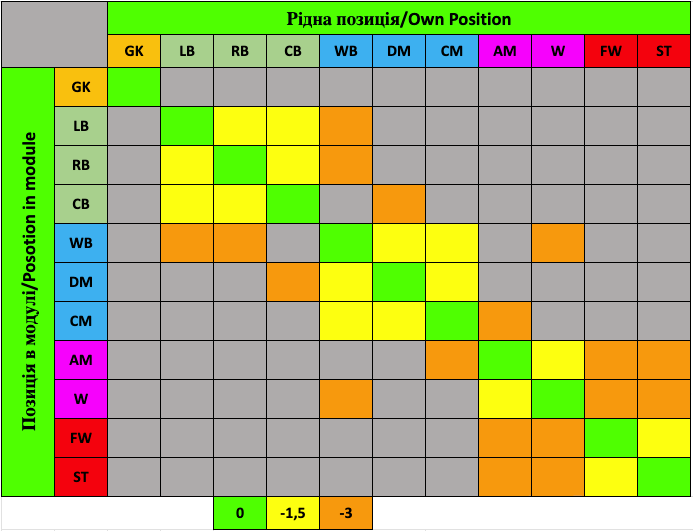
Position malus table
Shows the malus depending on the native position of the player and the position in the module
🛡️️ Defence bonus
To increase the value of defenders, MantraFootball has an additional defense bonus. Its size is calculated based on the average value of the defenders' basic scores (before taking into account bonuses and maluses).
The result is converted into additional points for the team:
Range of average score
Defence bonus
Less than 7.00
0 points
7.00 - 7.24
1 point
7.25 - 7.49
2 points
7.50 - 7.74
3 points
7.75 - 7.99
4 points
8.00 or above
5 points

Example
(8.4 + 5.3 + 7.5 + 8.5)/4 = 29,7/4=7.425
The average value of 7.425 is converted into a defence bonus of 2 points.
The goalkeeper's score is not taken into account when calculating the defense bonus.
Calculation of results
The sum of points scored by the 11 main players of the team is converted into team goals as follows:
- 0 goals = less than 72 points
- 1 goal = from 72 to 78.99 points
- 2 goals = from 79 to 85.99 points
- 3 goals = from 86 to 92.99 points
- 4 goals = from 93 to 99.99 points
- 5 goals = from 100 to 106.99 points
And so on, every extra 7 points of the team is a +1 goal to the total score.
League Table
The team that scores more goals in a league match wins.
- Win = 3 points
- Draw = 1 point
- Defeat = 0 points
The standings are formed on the basis of team points
In case of equality of team points, the team with the most goals scored is placed higher. In the case of equality of this indicator, the team with more victories also has an advantage. In the event of a tie, the next indicators for comparison are the total score and the total score in head-to-head matches.
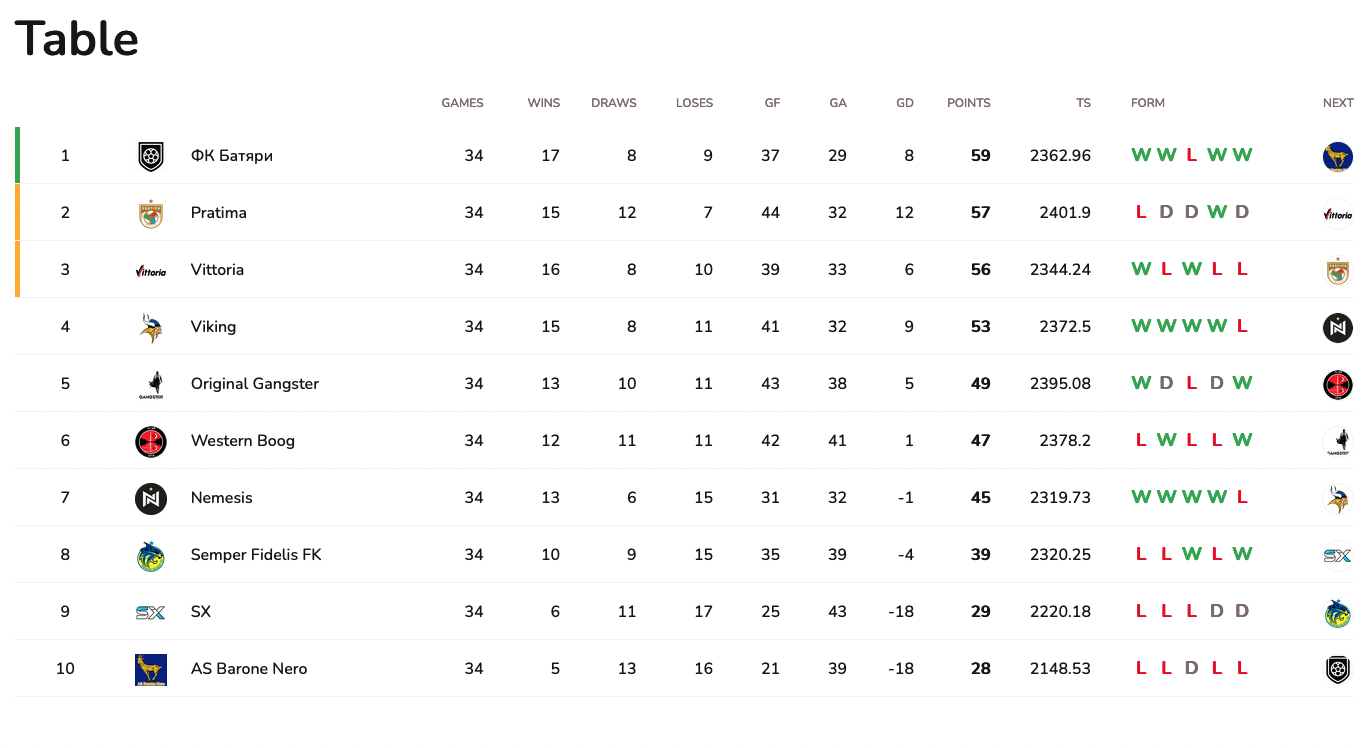
Table
An example of League table
Divisions
According to the results of the competition, the champion of each league, whose participants made organizational contributions, receives a championship trophy.
To win the championship title, the team manager must personally set his team's lineup for 50%+1 round in the league.
At the end of the season, the teams at the top of the table (positions marked in green in the league standings) are promoted to the higher divisions, and the teams at the bottom of the table (positions marked in red) are relegated to the lower divisions.
Note!
- If a team plays in the lowest division of the championship, it is not relegated from it even after taking a place in the relegation zone.
- The number of teams relegated to a lower division may vary if not all leagues are recruited in the lower division.
- Teams from lower divisions may receive additional promotion spots a team from a higher division withdraws from the competition. The criteria for selecting a team to be promoted from a lower division are the following: 1) position in the standings; 2) average points scored per round; 3) average goals scored per round.
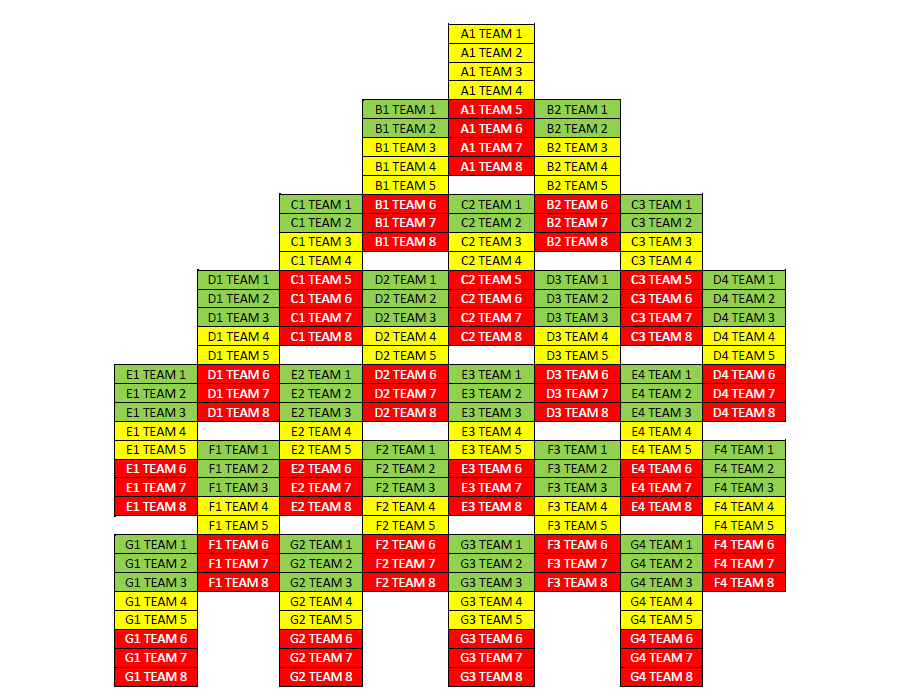
Divisions map
Green places - promotion to a higher division, red - relegation to a lower one
In order to ensure fair play, the manager may be deprived of the opportunity to lead his team.
The procedure for dismissing the manager from the team:
- MantraFootball users have the ability to report to game administrators managers who do not set a lineup for 4 or more rounds.
- In case of confirmation of manager inactivity, administrators contact such manager.
- If the manager declares that he wants to play further, then he is given a trial period - 3 rounds.
- If this manager continues to fail to set a lineup, the other league managers have the right to hold a closed vote to replace the manager for this team.
- If the majority vote for a replacement, the administrators look for a new manager for that team.
Fanta
In addition to the classic Mantra leagues, for the Euro, World Cup and Champions League we have another format of the tournament - Fanta.
Differences from the Mantra:
- No auction: coaches each game day select 11 players from a list of teams playing that day under any module of their choice.
- Players in different managers' teams may be repeated, but there are no substitutes.
- There are limits on the number of players from one team on a particular game day (depends on the number of real teams playing that day).
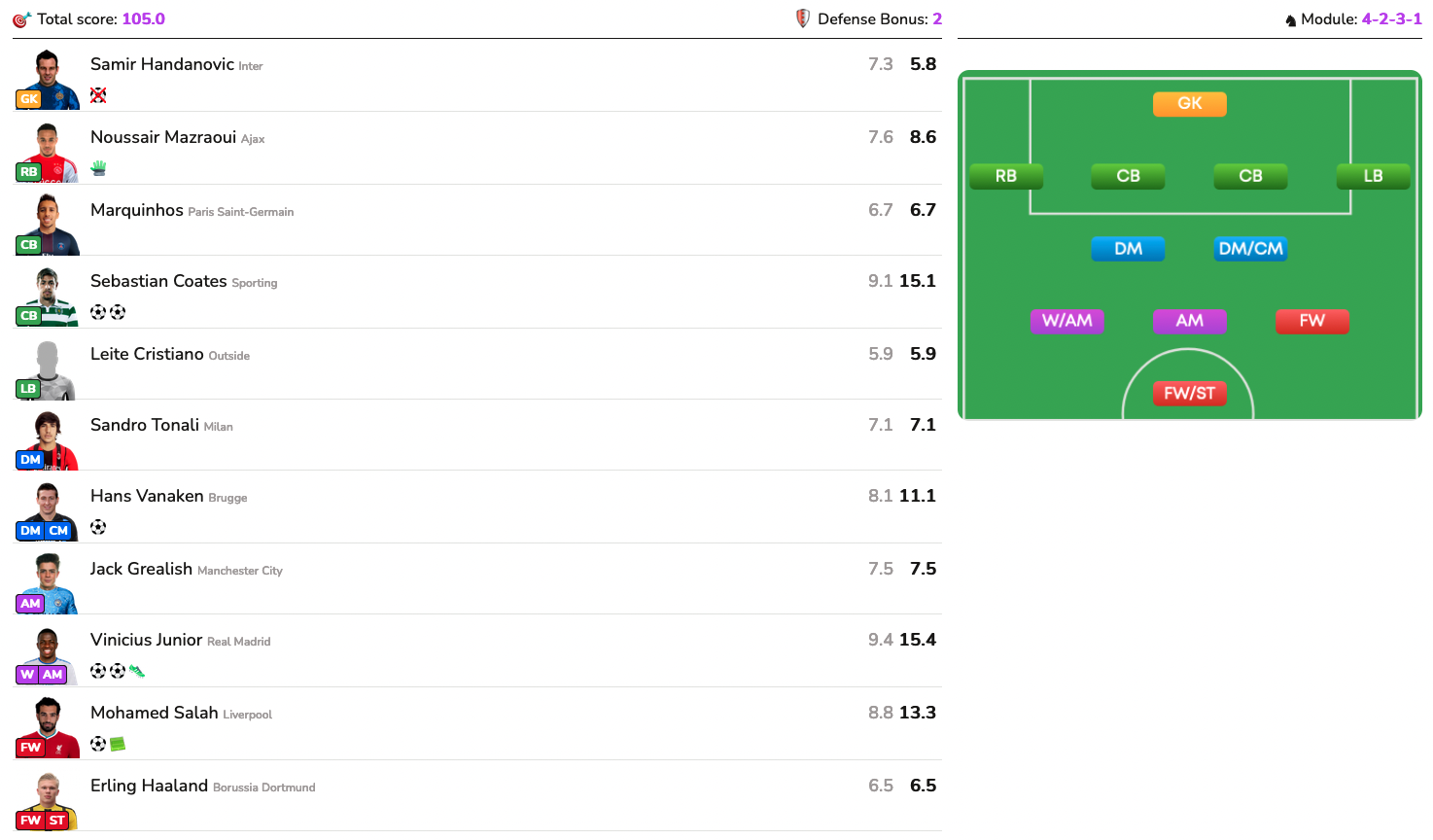
Fanta squad
An example of the squad in the Fanta-type tournament
Table
In Fanta tournaments there are 3 prize competitions:
- Total score - the sum of points scored by the manager during the season.
- Scoring according to the biathlon system - points are awarded to the 40 best teams of each game round. The manager who scored the most points on the game day gets 60 points, the second result - 54 points, and so on: 48, 43, 40, 38, 36, 34, 32, 31... 2, 1 respectively.
- The best lineup for all game days of the tournament (by the amount of points scored during one game day).
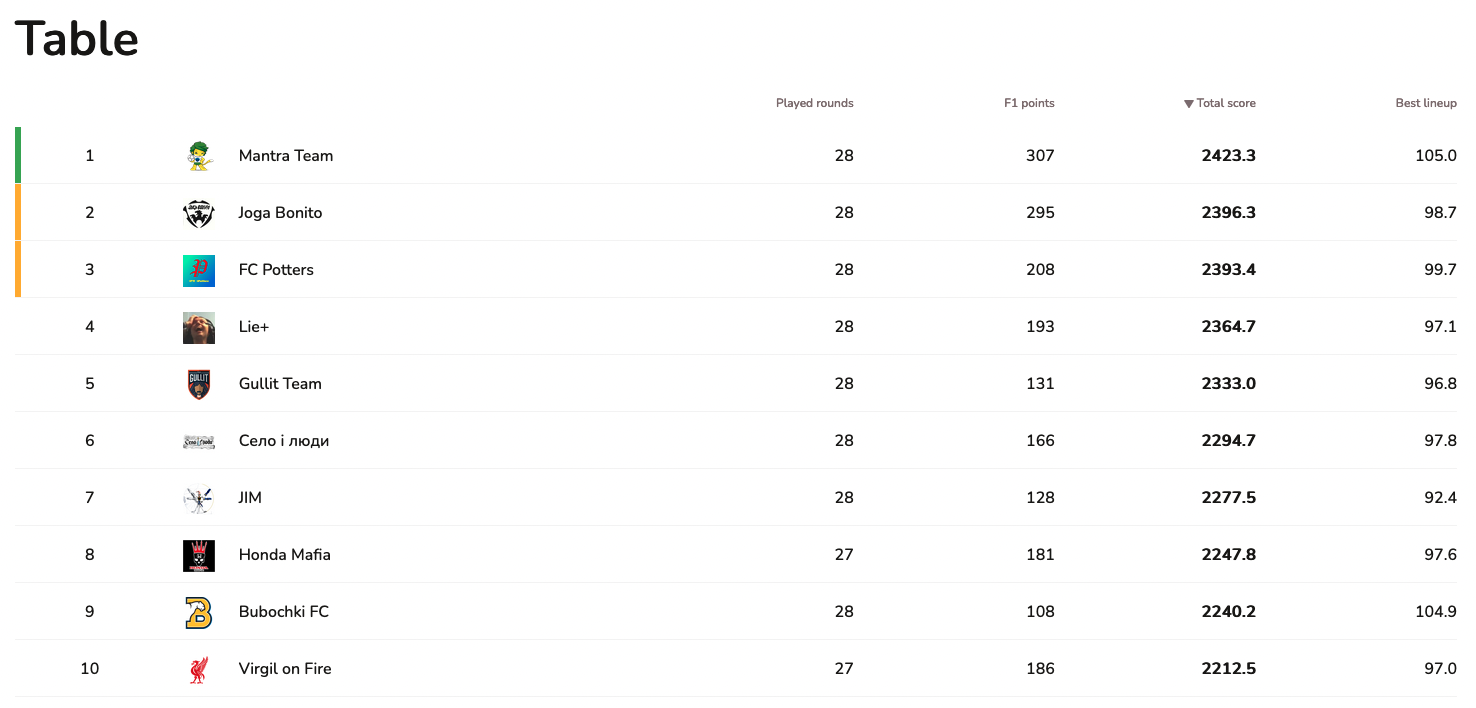
Fanta table
An example of the table in the Fanta-type tournament
